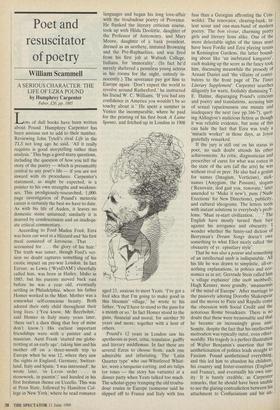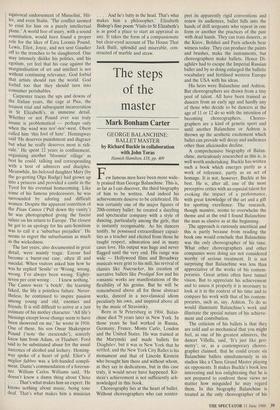Poet and resuscitator of poetry
William Scammell
A SERIOUS CHARACTER: THE LIFE OF EZRA POUND by Humphrey Carpenter
Faber, £20, pp. 1005
Lots of dull books have been written about Pound. Humphrey Carpenter has been anxious not to add to their number. Reviewing John Tytell's rival Life in the TLS not long ago he said, 'All it really requires is good storytelling rather than analysis.' This begs a good many questions, including the question of how you tell the story of the poetry — which is presumably central to any poet's life — if you are not inward with its procedures. Carpenter's statement, as might be expected, is a pointer to his own strengths and weaknes- ses. This prodigiously-researched, 1,000- page investigation of Pound's meteoric career is certainly the best we have to date. As with his life of Auden, it leaves no domestic stone unturned; similarly it is marred by condescension and an inadequ- ate critical commentary.
According to Ford Madox Ford, Ezra was born out west in a blizzard and 'his first meal consisted of kerosene. That . . . accounted for . . . the glory of his hair.' The truth was tamer, though Ford's ver- sion no doubt captures something of ' his exotic impact on pre-war London. In fact Ezroar, as Lewis (`WynDAM) cheerfully called him, was born in Hailey, Idaho in 1885, but his parents moved back east before he was a year old, eventually settling in Philadelphia, where his father Homer worked in the Mint. Mother was a somewhat self-conscious beauty. Both adored their only child throughout their long lives. ('You know, Mr Beerbohm,' said Homer in Italy many years later, 'there isn't a darn thing that boy of mine don't know.') His earliest important friendships were with a painter and a musician. Aunt Frank 'started me globe- trotting at an early age', taking him and his mother off on a three-month trip to Europe when he was 12, where they saw the sights in England, Germany, Switzer- land, Italy and Spain. 'I was interested', he wrote later, 'in LATIN order . . . in stonework, in paintin';' and handed in his first freshman theme on Uccello. This was at Penn State, followed by Hamilton Col- lege in New York, where he read romance languages and began his long love-affair with the troubadour poetry of Provence. He flunked the literary criticism course, took up with Hilda Doolittle, daughter of the Professor of Astronomy, and Mary Moore, daughter of a bank president, dressed as an aesthete, imitated Browning and the Pre-Raphaelites, and was fired from his first job at Wabash College, Indiana, for 'immorality'. (In fact he'd merely sheltered a penniless young actress in his rooms for the night, entirely in- nocently.) The severance pay got him to Europe again. 'Don't expect the world to revolve around Rutherford,' he instructed his friend W. C. Williams. 'If you had any confidence in America you wouldn't be so touchy about it.' He spent a summer in Venice the incomparable, where he paid for the printing of his first book A Lume Spento, and fetched up in London in 1908
aged 23, anxious to meet Yeats. 'I've got a fool idea that I'm going to make good in this bloomin' village,' he wrote to his father. 'You'll have to stand to the guns for a month or so.' In fact Homer stood to the guns, financial and moral, for another 50 years and more, together with a host of others.
Pound's 12 years in London saw his apotheosis as poet, critic, translator, gadfly and literary middleman. In fact there are several Ezras to choose from, each one admirable and infuriating. The 'Latin Quarter type' who out-Whistlered Whist- ler, wore a turquoise earring, and ate tulips (or roses — the story has variants) at a dinner party when Yeats talked too much. The scholar-gypsy tramping the old trouba- dour routes in Europe (someone said he slipped off to France and Italy with less
fuss than a Georgian affronting the Cots- wolds). The renovator, clearing-bank, ta- lent scout and one-man-band of Modern poetry. The bon viveur, charming pretty girls and literary lions alike. One of the more delectable sights of the times must have been Fordie and Ezra playing tennis in Kensington Gardens, the latter bound- ing about like 'an inebriated kangaroo', each making up the score as the fancy took him, discussing meanwhile the prosody of Arnaut Daniel and 'the villainy of contri- butors to the front page of The Times Literary Supplement'. Carpenter searches diligently for warts, foolishly dismissing T. E. Hulme, disparaging Pound's criticism and poetry and translations, accusing him of sexual rapaciousness one minute and inadequacy the next (see pp.166-7), quot- ing Aldington's malicious fiction as though it was reliable evidence, but none of this can hide the fact that Ezra was truly a 'miracle worker' in those days, as Joyce gratefully remarked.
If the jury is still out on his status as poet, no such doubt attends his other achievements. As critic, diagnostician and prescriber of cures for what was rotten in the state of the arts (all the arts) he was without rival or peer. He also had a genius for names (Imagism, Vorticism), nick- names (Amygism, the Possum), slogans ('Renovate, dod gast you, renovate,' later amended to 'Make it new'), puns (Nude Erections' for New Directions), publicity and cultural ideograms. The letters teem with instant solutions to everybody's prob- lems. 'Must re-start civilization. . . The English have mostly turned their face against his arrogance and obscurity. I wonder whether the funny-sad diction of Berryman's Dream Songs doesn't owe something to what Eliot nicely called 'the obixurity of yr. episstlary style'.
That he was also a poseur and something of an intellectual snob is indisputable. All his life he was drawn to simplistic, all-or- nothing explanations, in politics and eco- nomics as in art. Gertrude Stein called him 'a village explainer' (the snob snobbed); Hugh Kenner, more grandly, 'amanuensis of the mind of Europe'. After marriage to the passively adoring Dorothy Shakespear and the moves to Paris and Rapallo come the obsession with Social Credit and the notorious Rome broadcasts. There is no doubt that these were treasonable and that he became an increasingly gross anti- Semite, despite the fact that his intellectual motivation was typically outré, even other- worldly. His tragedy is a perfect illustration of Walter Benjamin's assertion that the aestheticisation of politics leads straight to Fascism. Pound aestheticised everything' and this led him to abandon his children, his country and foster-countries (England and France), and eventually his own san- ity. It is barely credible, as Carpenter remarks, that he should have been unable to see the glaring contradiction between his attachment to Confucianism and his un- equivocal endorsement of Mussolini, Hit- ler, and even Stalin. 'The conflict seemed to exist for him on a purely intellectual plane.' A world free of usury, with a sound constitution, would have found a proper role for the likes of Ezra Loomis Pound, Lewis, Eliot, Joyce, and not sent Gaudier off to the trenches to be slaughtered. One may intensely dislike his politics, and his egotism, yet feel that his case against the marginalisation of art and intellect is not Without continuing relevance. God forbid that artists should run the world. God forbid too that they should turn into consumer perishables.
Carpenter traces the ups and downs of the Italian years, the cage at Pisa, the treason trial and subsequent incarceration in St Elizabeth's, in immense detail. Whether or not Pound ever was truly insane is problematical — perhaps only When the wind was nor'-nor'-west. Olson called him 'this fool of hate'. Hemingway said 'He deserves punishment and disgrace but what he really deserves most is ridi- cule.' He spent 12 years in confinement, organising another `bloomin' village' as best he could, talking and corresponding With a host of admirers and disciples. Meanwhile, his beloved daughter Mary (by the go-getting Olga Rudge) had grown up into a princess and provided a castle in the Tyrol for his eventual homecoming. Like some of his famous predecessors, he was surrounded by adoring and difficult women. Despite the apparent contrition of the Pisan Cantos (Tull down thy vanity') he was photographed giving the fascist salute on his return to Europe. The closest he got to an apology for his anti-Semitism was to call it a 'suburban prejudice'. He seems to regret the suburbanism as much as the wickedness.
The last years, also documented in great detail, were mainly tragic. Ezroar had become a burnt-out case, often ill and suicidal. When visitors asked him how he was he replied 'Senile' or 'Wrong, wrong, wrong. I've always been wrong. Eighty- seven per cent wrong. . . I knew nothing.' The Cantos were 'a botch', the learning faked, the life a pointless failure. Never- theless, he continued to inspire passion among young and old, enemies and friends. It is still difficult to arrive at a just estimate of his motley character. 'All life's blessings except loose change seem to have been showered on me,' he wrote in 1916. One of these, his son Omar Shakespear Pound ('note the crescendo'), scarcely knew him from Adam, or Flaubert. Ford said to be substituted abuse for the usual narcotics of alcohol and lechery. Heming- way spoke of a heart of gold. Eliot's il miglior fabbro was a left-handed compli- ment, Dante's commendation of a forerun- ner. William Carlos Williams said, 'He doesn't know a damn thing about China • . . . That's what makes him an expert. He knows nothing about music, being tone deaf. That's what makes him a musician . . . . And he's batty in the head. That's what makes him a philosopher.' Elizabeth Bishop's fine poem 'Visits to St Elizabeth's is as good a place to start an appraisal as any. It takes the form of a compassionate but clear-eyed account of The House That Jack Built, splendid and miserable, con- structed of marble and straw.



































































 Previous page
Previous page